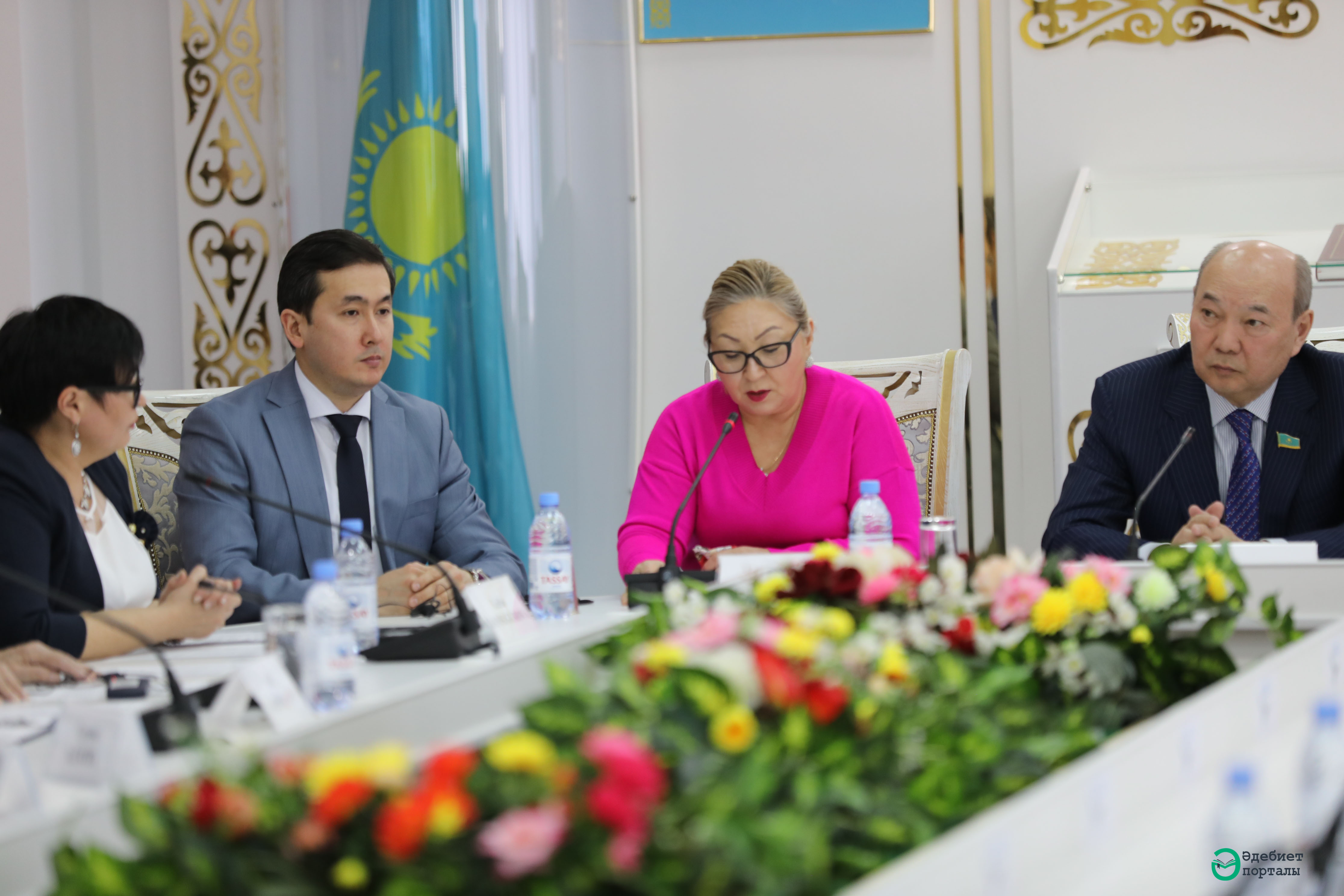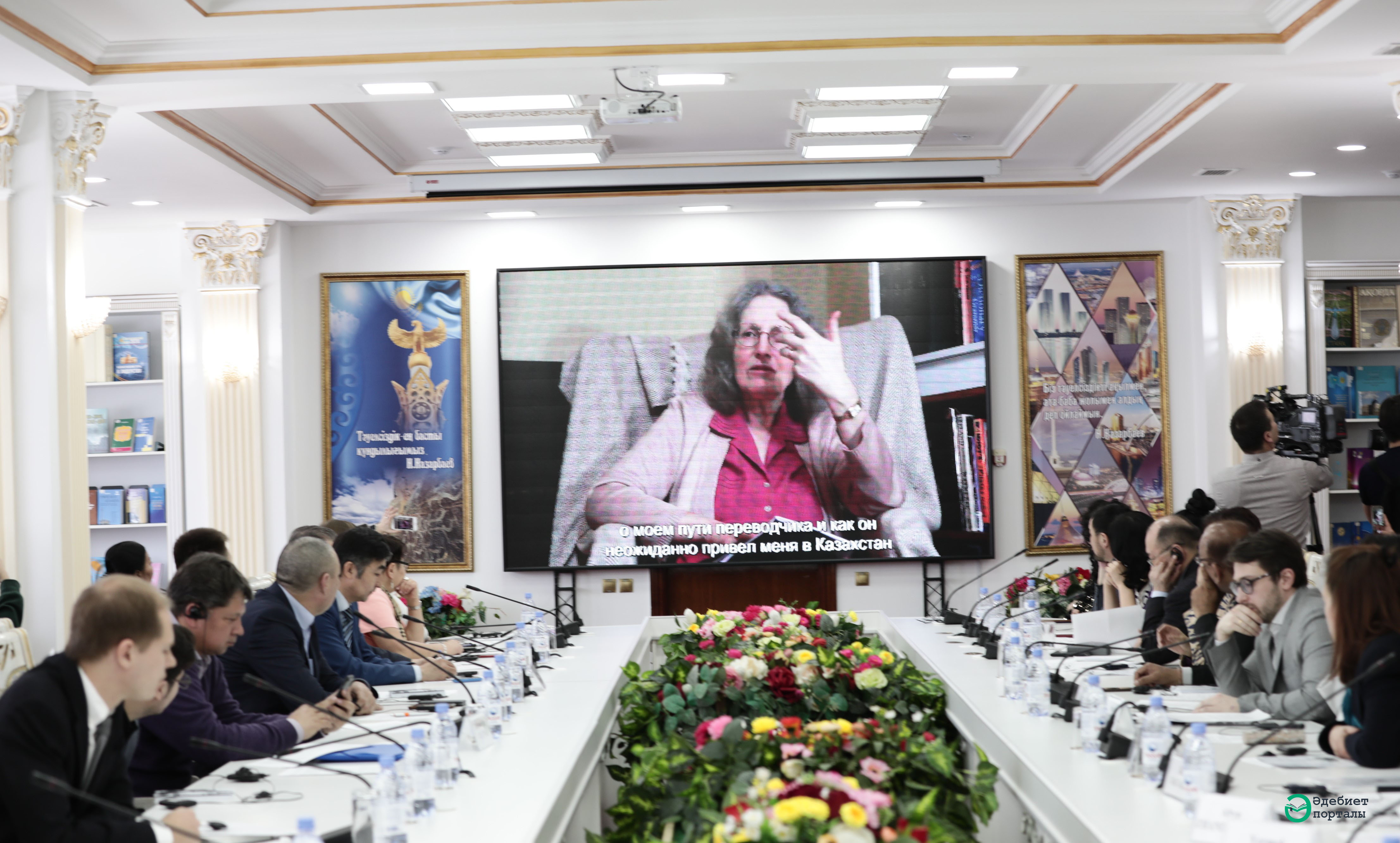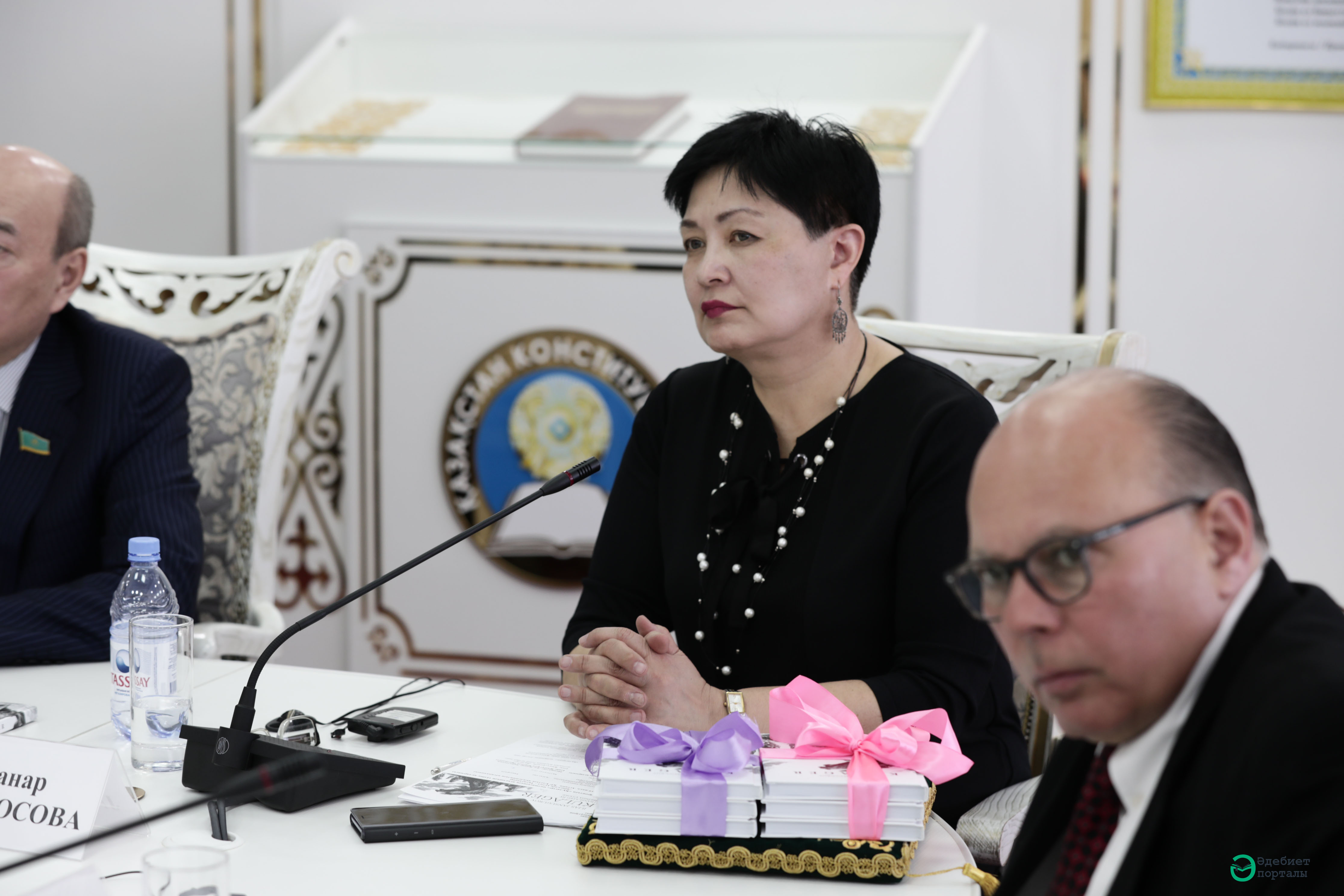In honor of the 125th anniversary of the birth of the bright Qazaq poet Ilyas Dzhansugurov on April 2, 2019, the presentation of the English version of the book ‘Kulager’ was held in the National Academic Library of the Republic of Qazaqstan.

In the centre - Head of the National Academic Library of the Republic of Qazaqstan,
in the left side - descendants of the poet.
The presentation was a part of a round-table, devoted to discussion of the history related to the book and its author. The event was participated by prominent scientists, experts, public figures, journalists as well as descendants of the poet.

The poem tells about one of the episodes of the life of the Qazaq national poet - akyn, singer and composer Akhan-sere (1844-1913).

Dr.Uli Schamilogly, professor, Department of Qazaq Language and Turkic Studies, Nazarbayev University
Akhan-sere had a horse named Kulager. The nickname is associated with a horse’s coat and means a light brown horse with black mane and tail. Akhan-sere even composed a song dedicated to his horse, called ‘Manmanger’.
Kulager and its owner Akhan-sere won all races. A lot of rich people were dreaming of having the racehorse. They were ready to give a beautiful girl without a kalym (a bride price) to the widowed Akhan. But the singer impoverished by that time did not simply say ‘No’, he behaved arrogantly with those who were not accustomed to being refused anything. As a result, the irreversible has occurred ….
On one of the feasts of the Kerey Sagynay Bai (one of the richest and powerful person of that time), where came all important and wealthy representatives of three Qazaq zhuzes, a big race of horses was organized. More than 1,300 best horses from the Great Steppe of Qazaqstan and neighboring Kyrgyzstan took part in the race. Kulager, a racehorse was a leader of the race, but an ambush, set by people of one of the richest people of that time, Batyrash awaited it in the bushes. The villains grabbed the horse’s bridle and killed it with an ax blow to the head.
A boy named Boribay, who rode on Kulager, was unable to protect his horse. Akhan-sere felt something was wrong and went towards the racers approaching the finish line. He had already seen from a distance, that Kulager was not among leaders of the race. His anxiety turned into panic. He saw Boribay, who took off Kulager’s bridle, was walking to the finish line. People say, that shocked Akhan-sere cut off Kulager’s head and carried it with himself all his life.
Ilyas Dzhansugurov in the poem ‘Kulager’ turned a murder of a famous horse into a symbolic, thought –provoking event. He showed how Qazaq people morally degraded in the colonial period, learned the bad trait to hate all the bright and extraordinary.
Ilyas Dzhansugurov prophetically announced the beginning of a new era for the Qazaqs - the era of jealousy and base hearted people, when to kill or to trip up someone, who runs first is a rule of everyday life.
Ilyas Dzhansugurov’s poem was published in a leading newspaper of the country ‘Socialistik Qazaqstan’ in 1937. The writing became extremely popular among readers. Each issue of the newspaper with a new chapter of the poem was awaited by readers with great impatience. However, the Soviet power found its content inappropriate to its ideology. Soon after the publication of the poem the poet was arrested and executed by a firing squad, and the newspaper’s editions with ‘Kulager’ poem and all its manuscripts were seized and destroyed. The author did not have time to publish the poem in a hardcover.
It seemed the poem was lost. But, by chance, in the 60s of the last century, a certain pensioner under a surname Golubyatnikov bequeathed after his death to give all his papers to the archive. The manuscripts of Ilyas Dzhansugurov, including the poem ‘Kulager’ were found among his papers. It turned out that the pensioner in the 30s of the last century was an investigator of the NKVD, and he had to burn the papers of the poet, but he kept them. These manuscripts are now stored in the State Archive of the Republic of Qazaqstan.
At the same time, the children's writer Sapargali Begalin retained the issues of the newspaper with the published poem. Before the rehabilitation of Ilyas Dzhansugurov’s name, he kept these newspaper clippings in ... pillows. His relatives even thought that the writer lost his mind, because he never let any member of his family to touch those pillows.
The daughter of the poet Ilfa Dzhansugurova-Jandosova told in one of her interviews:
- “When in the spring of 1957 we received a confirmation letter about my father’s rehabilitation, I was 22 years old. And I remember well how, on one of the days, my mother together with Mukhtar Auezov and poet Gali Ormanov, sitting in a room, prepared for printing the first, after my father’s rehabilitation, book of poetry.
The work was in full swing when a family friend, a wonderful children's writer Sapargali Begalin, appeared in our home. As soon as he crossed the threshold, he handed mum some kind of bundle. It turns out that there was a parcel from 16 issues of the newspaper “Socialistik Qazaqstan” for 1937 with the ‘Kulager’ poem printed in them.
Neat and prudent Sapargali Begalin collected the issues of the newspaper, where the poem ‘Kulager’ was published, and having learned that Ilyas Dzhansugurov was arrested by the NKVD, he hid them in three innocent, cross-stitched pillows, which nobody was allowed to touch. They were like a decoration of a sofa in his study, and from time to time they were taken out to the street to dry out. If the children, playing in the battle tried to touch them, the writer got very angry. So, thanks to Sapargali Begalin, we had the full version of the poem ‘Kulager’ on our hands. My mother at that moment was shocked.
Saved by a good fortune the poem ‘Kulager’ was immediately included in the poetry book to be published”.
Ilyas Dzhansugurov’s poetry book was published in 1957. The Russian translation of the poem ‘Kulager’ was performed in 1958, later in 2006 the second version of the translation was done. In 2016, thanks to the Goethe-Institut, the poem was translated into the German language. A translation was done by German translator Gert Heidenreich.
Preparation of the English version of the poem started in 2009. However, for various reasons, the translation was postponed and generally lasted eight years. The translation was carried out by the British poetess Belinda Cooke, who previously worked with the works of Mandelstam, Tsvetaeva and Pasternak.

Belinda Cooke, translator, connecting via video
According to the poet and translator, the translation work on the poem ‘Kulager’ was truly invaluable experience for her. “When I began to translate from the Qazaq language, it so happened that I had to work with a word-to-word translation and it created some difficulties for me, because it did not allow me to see the whole picture, the whole story. As a result of our negotiations, I was invited to visit Qazaqstan. During the trip people that accompanied me gave me the opportunity to plunge into the heart of the poem. Now I understand how different is the experience of translating from a language you do not know. Here my friends, with whom we worked together on the translation of the poem, helped me a lot. In such cases you need someone who will give you a common understanding through the word-to-word translation, but after that you will need a lot of communication with experts in all aspects of the culture of the people, so that everything will fall into place,” she explained.
Belinda Cooke noted that the poem of the Qazaq poet Ilyas Dzhansugurov ‘Kulager’ is the best way to get involved and understand the Qazaq culture.
The idea of translating the poem ‘Kulager’ into English was put forward by the Ilyas Dzhansugurov Foundation, headed by his granddaughter Janar Jandosova.

Ilyas Dzhansugurov Foundation's Director, Janar Jandosova
It is symbolic that Ilyas Dzhansugurov’s poem ‘Kulager’ was published with the assistance of the National Translation Agency of Qazaqstan, whose task is to promote and translate the best examples of Qazaq literature and culture to the world community. This is the first work of Qazaqstan literature published under the label of the National Translation Agency of Qazaqstan.
To copy and publish materials, you must have written or oral permission from the editorial board or the author. A hyperlink to the Adebiportal.kz portal is required. All rights reserved by the Law of the Republic of Kazakhstan "On Copyright and Related Rights". adebiportal@gmail.com 8(7172) 57 60 14 (in - 1060)
The opinion of the author of the article does not represent the opinion of the editorial board.



